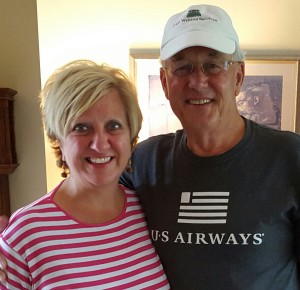The Captain’s Corner
 When I think of my career as a pilot—starting at age fifteen and lasting nearly fifty years—I am fascinated by how much the word trust surfaces in both the physical and mental activity of flight. Trust is relying on someone or something completely external to one’s person. It extends to the design and construction of the aircraft, its maintenance, the loading and fueling of the aircraft before flight, and also the professionalism of the air traffic controllers during flight to keep two airplanes from being in the same place at the same time. Of course, the passengers are trusting the pilots and flight attendants to help them have a safe and enjoyable flight to their destination.
When I think of my career as a pilot—starting at age fifteen and lasting nearly fifty years—I am fascinated by how much the word trust surfaces in both the physical and mental activity of flight. Trust is relying on someone or something completely external to one’s person. It extends to the design and construction of the aircraft, its maintenance, the loading and fueling of the aircraft before flight, and also the professionalism of the air traffic controllers during flight to keep two airplanes from being in the same place at the same time. Of course, the passengers are trusting the pilots and flight attendants to help them have a safe and enjoyable flight to their destination.
But let’s focus on the pilots and their environment. In flying’s early days, the idea was commonly accepted that pilots could and should fly in any kind of weather—just take off and settle down in the clouds, though they couldn’t see the ground. Soon (and often with the tragic result of the pilot losing control of the airplane) the aviation industry realized that pilots could not rely on their natural sense of balance to keep the plane right-side-up in the clouds. Thus, the concept of “blind flying” (as it was originally called) came into practice.
Blind flying became known as “instrument flying.” In instrument flying, the pilot is trained to completely ignore his or her sense of equilibrium and trust the instrument panel to tell him or her the balance, position, and direction of the flight. This trust in the instruments is absolute. The life of everyone aboard the plane completely depends on it. “Trust your instruments; don’t believe your sense of balance!” flying instructors would preach. With training, practice, and experience, this trust becomes second nature and routine.
Trusting the flight instruments pictures the example of saving faith (trust) in Christ Jesus as personal Savior. Author Paul Chappell, in his book Disciple, writes: “Everyone trusts in something. Even atheists rely on their faith that God does not exist. Far more important than the quality or nature of our faith is the object of our faith. It is only when we trust in Jesus Christ that we find salvation, the forgiveness of our sins, and eternal life with Christ” (emphasis mine).
“It is better to trust in the Lord than to put confidence in man” (Psalm 118:8, KJV).
“And there is salvation in no one else; for there is no other name under heaven that has been given among men by which we must be saved” (Acts 4:12, NASB).
Who is the object of your trust?
____________________________
Joe Henderson, Brenda’s husband, is a retired international airline captain and now blogs in “The Captain’s Corner” on a regular basis.
Would you like to receive these posts in your Inbox? We won’t spam you! You will only receive e-mails from us when a new post appears on the blog. Click here to subscribe.

So enjoy reading Captain Joe’s blog as well as your own, Brenda. Read Joe’s aloud to Phil as he was having lunch. His comment, “Very good.”
Just another reason why Captain Joe and I would love to enjoy conversation over coffee with you and Phil, my friend!